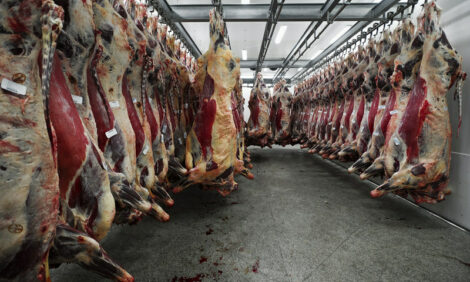



Beef Composting Reduces Antimicrobial Levels
US - Composting beef cattle manure, even with minimal management, can significantly reduce the concentrations of antibiotics in the manure, according to an Agricultural Research Service (ARS) pilot study.The scientists found that composting manure from beef cattle could reduce concentrations of antibiotics by more than 99 percent, reported Sharon Durham.
Osman Arikan, a visiting scientist from Istanbul Technical University, and ARS microbiologists Patricia Millner and Walter Mulbry at the Henry A. Wallace Beltsville Agricultural Research Center, in Beltsville, Md., looked at varying levels of manure management, including plain manure piles, and manure piles with straw added. They found that adding straw to manure piles tends to result in higher temperatures that speed up the process of degrading antibiotics as well as pathogens.
Photo courtesy of Natural Resources Conservation Service.
The use of antibiotics as therapeutic agents is widespread in the animal production industry. Scientific studies have shown that, depending on the antibiotic and type of animal, between 20 to 75 percent of antibiotics administered to animals is excreted via urine and feces. So it's important that these residues are broken down during composting to prevent their release into the environment.
Arikan, Millner, and Mulbry evaluated the efficacy of a series of minimal-management options for on-farm manure composting to reduce concentrations of the antibiotics oxytetracycline and chlorotetracycline. The treatments were designed to span a range of management options from simply piling up the manure to mixing it with an equal volume of straw (to increase aeration within the compost pile) and adding insulating layers of straw.
Results show that manure-only pile temperatures and the concentrations of antibiotics were significantly influenced by treatment over a 28-day period. Concentrations of oxytetracycline and chlorotetracycline incubated at ambient temperature decreased 75 percent and 90 percent, respectively.
Oxytetracycline and chlorotetracycline concentrations in samples incubated for 28 days within an amended manure pile decreased 91 percent and 99 percent, respectively. Although manure piles amended with straw attained higher temperatures and more rapid decreases in antibiotic concentrations, there is currently no compelling justification for producers to expend additional resources needed to achieve the more rapid rates of antibiotic removal. Pathogen reduction in manure piles requires careful and consistent management to ensure all parts of the pile are treated.
TheCattleSite News Desk


